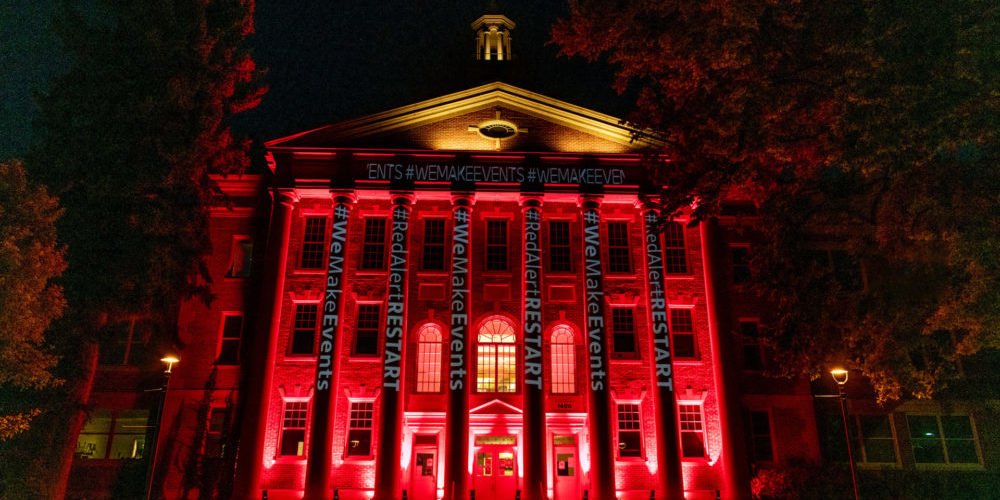
On Sept. 1, 2020, the University Center for the Arts participated in #RedAlertRestart. Venues across the nation lit their buildings in red to draw attention to the desperate need for help and support of the arts.
Michael Seman has been playing in bands since he was in high school. And for the past 20 years, he and his wife, Jennifer, have been performing with their band, Shiny Around the Edges, recording albums and playing at various venues across the country.
So, Seman has a personal stake in watching what the COVID-19 pandemic has done to the music industry over the past 7-plus months. It’s also been a fascinating study for Seman, an assistant professor in the Arts Management program at Colorado State University.
In March, Seman was asked by the office of Gov. Jared Polis to prepare a report estimating the impacts the pandemic would have on Colorado’s music industry. The results weren’t pretty.
“I had an idea of how the pandemic would affect the state’s creative industries,” said Seman, whose educational background is in urban planning and public policy. “I knew that the music industry was already experiencing substantial losses and that there would be no good news, but I really wanted to shed light on what was happening.”
‘Surreal’ results

Seman’s extensive research in Colorado revealed some sobering realities about an industry reeling from COVID-related closures. With most live music venues closed since March, pretty much everyone whose livelihood is tied to music is hurting.
From April 1 to July 31, Seman estimated that the state’s music industry lost $344 million and 8,327 jobs. With COVID refusing to loosen its grip, it’s difficult to project when most performance venues might reopen.
Seman then teamed with a fellow researcher, Richard Florida from the University of Toronto, to look at the pandemic’s impacts nationally on all of the creative industries, including the fine arts, design, film, fashion and more. Support from the original CARES legislation provided about $40 million for wage-earning artists and musicians – none for those who depend on royalties and gigs. Seman and Florida estimate that $74 billion in average monthly earnings were lost for those in creative occupations between April and July.
“Honestly, it was surreal,” he said of the research. “When I was at the University of North Texas I worked in economic development, and we would occasionally model what would happen to oil-producing regions if the price of crude dropped precipitously or examine past events like how the Great Recession affected the creative economies of metropolitan regions within the state, but these numbers (for the pandemic) were just overwhelmingly large, like Hurricane Katrina happening everywhere, all at once, for several months.” Seman adds, “It’s one of the most depressing things I’ve ever worked on.”
“The losses are of such a magnitude that there really needs to be a coordinated effort at the federal level that trickles down to help people and organizations on the state and local levels.”
Finding new answers
Still, Seman is cautiously optimistic and sees the pandemic as a possible turning point for the arts and the industries they drive.
“In some ways, the pandemic is like that scene in the Wizard of Oz, where the curtain is pulled back and everyone can see how Oz is run – for better or worse,” he said. “There were growing structural problems in many of the creative industries before the pandemic – especially in music where streaming has posed huge challenges for many artists who now rely heavily on live shows for income.”
He continued, “More importantly, COVID has highlighted how important the arts, especially live performances, are to people across the country after so many months without them. It was a good wakeup call for everyone to understand the value of the arts and start thinking about ways to better support them within our country.”
Featured panelist

Seman will be one of the panelists Tuesday, Oct. 6, when the College of Liberal Arts continues its 25th edition of Great Conversations. The panel, which includes Bryce Merrill, music programs manager for Bohemian Foundation, and alumnus Stephen Brackett, co-founder of Youth on Record and lead singer for the Flobots, will discuss Music Cities Collaboration.
About Great Conversations
The College of Liberal Arts has been sponsoring Great Conversations for the past 25 years, with thought-provoking speakers taking part in lively discussion around topics of local, national and global importance. The members-only 2020 season includes seven events – currently all virtual. Membership supports all liberal arts faculty.